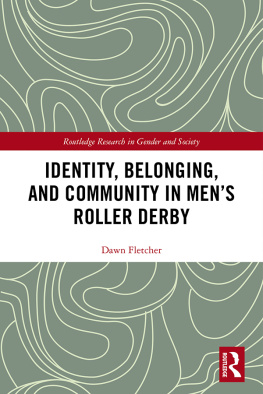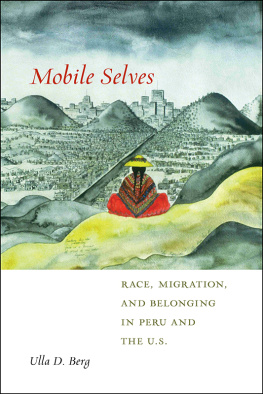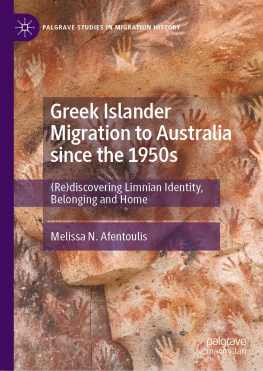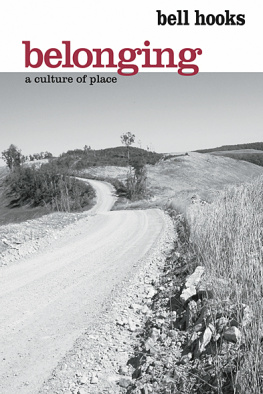

First published in Great Britain in 2015 by
Policy Press University of Bristol 1-9 Old Park Hill Bristol BS2 8BB UK Tel +44 (0)117 954 5940 e-mail
North American office: Policy Press c/o The University of Chicago Press 1427 East 60th Street Chicago, IL 60637, USA t: +1 773 702 7700 f: +1 773-702-9756
Policy Press 2015
British Library Cataloguing in Publication Data
A catalogue record for this book is available from the British Library
Library of Congress Cataloging-in-Publication Data
A catalog record for this book has been requested
ISBN 978-1-4473-1330-4 Hardcover
ISBN 978-1-4473-3450-7 ePub
ISBN 978-1-4473-3451-4 Mobi
The right of Anya Ahmed to be identified as author of this work has been asserted by her in accordance with the Copyright, Designs and Patents Act 1988.
All rights reserved: no part of this publication may be reproduced, stored in a retrieval system, or transmitted in any form or by any means, electronic, mechanical, photocopying, recording, or otherwise without the prior permission of Policy Press.
The statements and opinions contained within this publication are solely those of the author and not of the University of Bristol or Policy Press. The University of Bristol and Policy Press disclaim responsibility for any injury to persons or property resulting from any material published in this publication.
Policy Press works to counter discrimination on grounds of gender, race,
disability, age and sexuality.
Cover design by Policy Press
Front cover image: istock/Shutterstock
Readers Guide
This book has been optimised for PDA.
Tables may have been presented to accommodate this devices limitations.
Image presentation is limited by this devices limitations.
For Dan, for every little and big thing
Contents
The work for this book began over ten years ago and there are many people to whom I owe a huge debt of gratitude for their support, wisdom, encouragement and advice along the way. First I want to thank the women in Spain for taking part in my research, and for involving me in their lives, in particular, of course, Vera and Deidre for their hospitality, kindness, generosity and friendship.
My thanks go to Bogusia Temple who was there at the very beginning when I was thinking about undertaking a PhD and throughout my studies at the University of Central Lancashire. Bogusia introduced me to narrative analysis, has always challenged and inspired me and is now a valued friend. Thanks, too, to Nicky Stanley, whose painstaking attention to my drafts helped me develop as a writer. I must also extend gratitude to Annie Huntingdon for her insightful comments. Thanks to Graham Crow for suggesting that I write the book and to Peter Dwyer for encouraging me to actually do it and for giving feedback on the proposal. Thanks also to Karen OReilly for taking the time to discuss my ideas for the book. Thank you also to the reviewers of the proposal and of the final book.
I am very grateful to the commissioning editors at the Policy Press, Emily Watt and Isobel Bainton, for their enthusiasm about the book and their help throughout the publishing process.
Many, many thanks, too, to Louise Ackers, Chris Coey, Angela Cotton, Vanessa May, Debbie Millard and Julie Morton for their helpful comments on drafts of chapters and also for their encouragement. I also owe thanks to my colleagues in the School of Nursing, Midwifery, Social Work and Social Sciences at the University of Salford, in particular Karen Kinghorn and Steve Myers, the Knowledge and Place research group, and the Sustainable Housing and Urban Studies Unit. I owe a debt of gratitude to Alison Brettle and Paula Ormandy for their support and humour in the difficult times of writing.
On a personal note, heartfelt thanks to my own community for your love, giving me a sense of belonging and for believing in my abilities. First my family: my dad Abdi, my late mum Eunice, sister Alison and brother-in-law Bazill Ahmed Barrett; Aunty Win Andrews; my parents-in-law, Angela and Anthony Peacock, and the rest of the Peacocks; Mathew, Sally, Nancy and Kitty; and Edward and Jo. To my friends too, Julia Lucas, Race and Andy Williams, Val Alker and Pete Luddon, Lisa Beber, and Tony and Hilary Newman: thank you. Thanks also to Debbie Latimer, Asha Abdillahi, Hannah Cameron, Ubah Egal, Kiona Simpson and Ruth Webber.
Finally, thanks doesnt come close to capturing the depth of gratitude I feel to my husband, Dan: for your support throughout the highs and lows of writing, particularly in the final stages when my lovely mum died; for your unwavering belief in me; for taking on the cat; for the fun and laughter; and for being you.
In November 2000 I was visiting my friends Vera and Deidre at their house in Yorkshire, when Vera announced that they planned to retire early and move to the Costa Blanca in Spain the following year. Since the 1970s, they had taken regular holidays there and I was aware that they had recently visited again. What I didnt know was that this trip was actually an inspection visit organised by an agent who sold houses to the British market on behalf of property developers in Spain. My friends excitedly told me about their plans, imagining a future life where they would stroll along the beach in the evenings before going out in search of tapas and Rioja. Deirdre was particularly rapturous about having the opportunity to paint again, while Vera had a long list of places of cultural interest that she had always wanted to visit, but never had enough time to on holiday. They talked about the charms of the nearest town, Torrevieja, which they planned to frequent when they moved and they also looked forward to learning Spanish and getting to know the locals. Listening to my friends talk and hearing about their future plans, I became increasingly enthusiastic, especially when they extended an open invitation to me: I was welcome to visit any time I wanted for as long as I liked. They had already done their research and informed me that there were several affordable flights a day from Manchester (where I lived) to Alicante, the nearest airport, and that the journey would take just over two hours.
Vera and Deidre moved to the Costa Blanca in May 2001, and I visited them there for the first time in August of that year. Although their house was a 20-minute walk from the Mediterranean coast, rather than the imagined stroll through pleasant Spanish landscape, the route to the sea was through vast building sites and scrubland. The roads were unfinished, there was no public transport, and the whole area was very much a work in progress, and far from the Spanish paradise they envisaged. On my first visit I took a boat from Torrevieja to Cabo Roig, and was amused to overhear a game being played by a young boy and his father who were counting the cranes along the coast. There were dozens dotted along the coast line, evidence of rapid and haphazard house-building characterised by a lack of planning (Huete et al, 2008). Migration to this costa was gaining momentum.
Vera and Deirdre were also surprised and disappointed to find themselves living in estates packed with fellow country-men [sic] (Mantecon and Huete, 2007, 327): almost all of the residents on their urbanisation were British, with only one Spanish family, from Madrid, who had bought a second home there. However, at this point they were still very optimistic about their new life and anticipated that once the area was completed their Mediterranean idyll would materialise. They had already made several friends and had also joined a ladies club, and I met many of them on my first visit. All of these women had moved to Spain from the UK, most of them recently and all were unanimous in praising their new life there. Much of their talk centred on the sense of community which they felt had been revived in Spain, and they made frequent comparisons to the lack of community characterising life in the UK and expressed relief and joy at having found it again. Encouraged by Vera and Deidre, I visited again in December 2001 and at the Silver Ladies Christmas party, found myself having similar conversations about community and its decline in the UK. It was fascinating to hear about the womens motivations to move to Spain and their subsequent experiences and to note that their nostalgic recollections of past communities in the UK often precluded their own experiences and memories and preceded their lifetimes.







